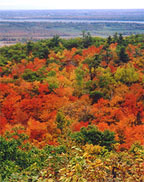
In the sky, we see migratory birds pass by in their V formation, so
characteristic, so intelligent. They are preparing for their long journey south.
Closer to home, the leaves on the trees are beginning to change colour, from
ochre to yellow to brown — offering us a brief spectacle of surprising beauty —
before covering the ground in a soft carpet of leaves.
And in the evening, in both the city and the countryside, when we already need
an extra layer, passers-by quicken their pace to reach the warm indoors.
These are so many signs that autumn has arrived!
While we can easily note the physical changes brought about by the passage into
autumn, what about the more subtle changes? Are we able to perceive the
difference in ambient energy after the Autumn Equinox?
With their formulas and images that still resonate with us, the Ancients spoke
of autumn as the springtime of the philosopher. Why? Because autumn is naturally
a time for reflection, internalization, patience and a vision of a future that
is still invisible.
Autumn is the time to harvest the fruits of the labours of summer, to appreciate
the generosity of the Earth. It is also the time when the physical world begins
to go to sleep, making room for the world of the soul which, with fewer
distractions, can grow and expand.
All traditions of wisdom speak to us of the soul but, strangely, very few people
today have a clear understanding of it. Maybe in this time of passage into
autumn, it is worthwhile to welcome with open arms the natural rhythm of the
seasons, which speaks to us of the soul through the language of symbolism.
Nature is like a great book that helps us understand, from within, a reality
that brings us all together: the human soul, in the image of a bird, is in
migration. It travels far and disappears — but does not die. It returns in the
spring, reborn and ready for another cycle.